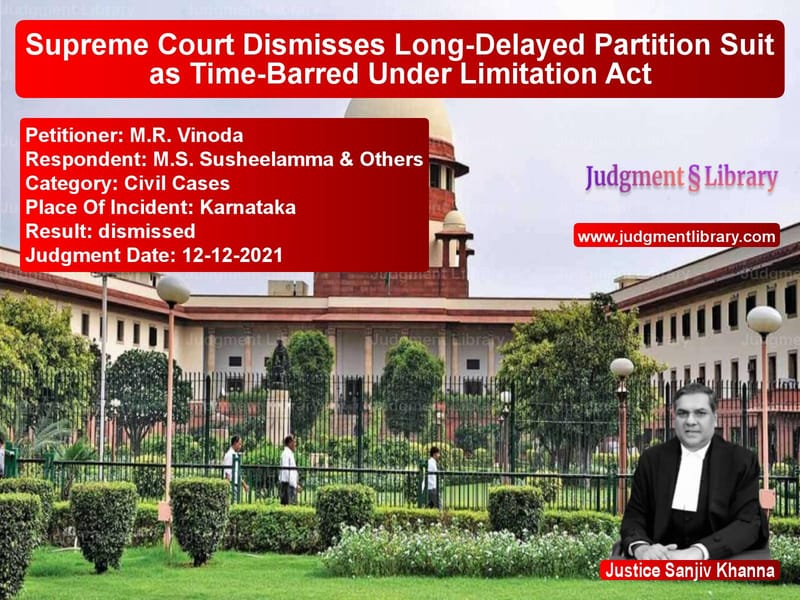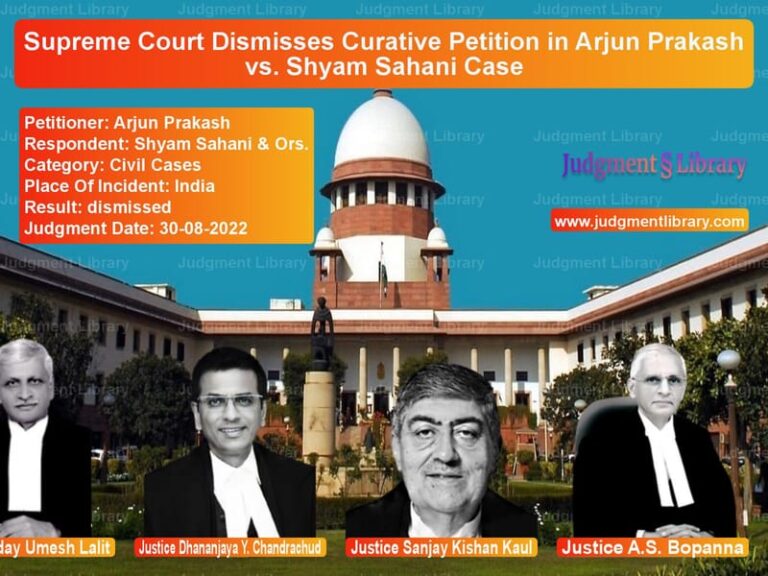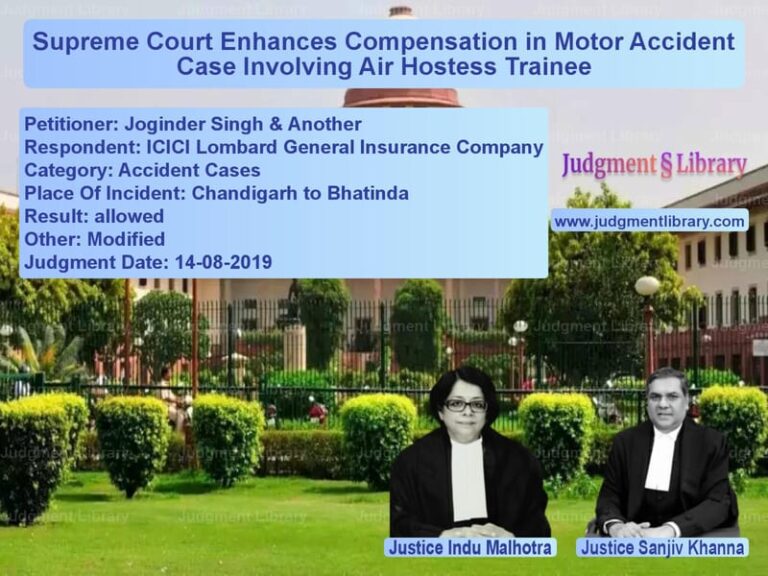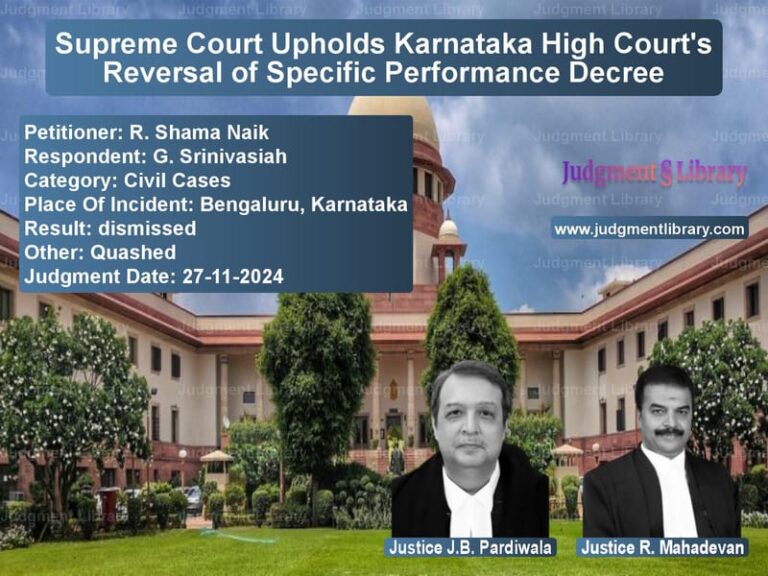Supreme Court Dismisses Long-Delayed Partition Suit as Time-Barred Under Limitation Act
The Supreme Court of India recently ruled in M.R. Vinoda vs. M.S. Susheelamma & Others, a case concerning a long-pending family property dispute. The Court upheld the Karnataka High Court’s decision, dismissing the petitioner’s partition suit as time-barred under the Limitation Act, 1963. The case revolved around a relinquishment deed executed in 1969 and its validity, with the plaintiffs claiming that they were wrongfully deprived of their property rights.
Background of the Case
The dispute arose in a Hindu joint family that owned multiple ancestral properties in Karnataka. In 1961, a partition took place among three branches of the family. A subsequent relinquishment deed was executed on March 13, 1969, wherein certain family members transferred their shares to another branch.
Years later, on November 18, 1994, younger members of one family branch, including M.R. Vinoda, filed a suit seeking partition of the property, arguing that the relinquishment deed was invalid and executed without proper consent. They sought a declaration that the deed was null and void and demanded a fresh partition of the ancestral property.
Key Issues in the Case
The Supreme Court analyzed the case based on the following crucial legal issues:
- Whether the relinquishment deed of 1969, executed by the eldest brother (acting as the Karta of the joint family), was legally valid under Hindu law.
- Whether the partition suit filed in 1994 was barred by limitation under the Limitation Act.
- Whether the relinquishment of ancestral property was legally binding upon minor family members who were represented by the family’s Karta.
Arguments Presented
Petitioners’ (M.R. Vinoda & Others) Arguments:
- The relinquishment deed was invalid as it was executed without obtaining the consent of all legal heirs and coparceners.
- One of the plaintiffs was a minor at the time of execution, making the deed unenforceable under Hindu law.
- The family property remained a part of the joint Hindu family estate and could not be alienated without the explicit approval of all members.
- The plaintiffs came to know about the deed much later, and hence, their suit should not be barred by limitation.
Respondents’ (Opposing Family Members) Arguments:
- The Karta (eldest male member) of a Hindu joint family has the authority to execute a relinquishment deed on behalf of all members, including minors.
- The relinquishment deed was legally executed, and the plaintiffs had knowledge of it for decades before filing the suit.
- The petitioners failed to challenge the relinquishment deed within the prescribed limitation period, which, under Article 58 and Article 109 of the Limitation Act, 1963, is three years for challenging a deed and twelve years for setting aside an alienation.
- Since the suit was filed in 1994, more than two decades after the deed’s execution, it was clearly time-barred.
Supreme Court’s Observations
The Supreme Court, after thoroughly examining the facts and the legal principles governing Hindu joint family property, made the following key observations:
- The Karta of a Hindu joint family has inherent authority to execute transactions on behalf of the family, including minors, unless the transaction is challenged in a timely manner.
- The petitioners had ample opportunity to challenge the relinquishment deed soon after they attained majority but failed to do so for more than 25 years.
- Under the Limitation Act, a suit for partition or setting aside an alienation of property must be filed within 12 years from the date of knowledge of the deed, making this suit time-barred.
- Even if the petitioners claimed they were unaware of the relinquishment deed, the burden of proof was on them to demonstrate their ignorance, which they failed to do.
- Courts cannot entertain stale claims that undermine legal certainty in property transactions.
Final Judgment
The Supreme Court ruled as follows:
- The suit was dismissed as time-barred under the Limitation Act.
- The relinquishment deed executed in 1969 was held to be legally valid.
- The petitioners had no right to seek partition of the property.
Key Takeaways
- Time Limits in Property Disputes: The judgment reinforces the principle that property claims must be filed within the prescribed limitation period.
- Karta’s Authority in Hindu Law: The ruling affirms that the eldest member of a Hindu joint family can act on behalf of others in property transactions.
- Judicial Precedent on Relinquishment Deeds: The judgment serves as a precedent for future cases where relinquishment deeds executed by family heads are challenged.
- Legal Certainty in Property Transactions: The ruling ensures that once a property transaction is completed, it cannot be challenged indefinitely.
This Supreme Court ruling provides clarity on family property disputes and strengthens the legal framework for upholding property rights in Hindu joint family structures.
Petitioner Name: M.R. Vinoda.Respondent Name: M.S. Susheelamma & Others.Judgment By: Justice Sanjiv Khanna.Place Of Incident: Karnataka.Judgment Date: 12-12-2021.
Don’t miss out on the full details! Download the complete judgment in PDF format below and gain valuable insights instantly!
Download Judgment: m.r.-vinoda-vs-m.s.-susheelamma-&-o-supreme-court-of-india-judgment-dated-12-12-2021.pdf
Directly Download Judgment: Directly download this Judgment
See all petitions in Property Disputes
See all petitions in Succession and Wills
See all petitions in Judgment by Sanjiv Khanna
See all petitions in dismissed
See all petitions in supreme court of India judgments December 2021
See all petitions in 2021 judgments
See all posts in Civil Cases Category
See all allowed petitions in Civil Cases Category
See all Dismissed petitions in Civil Cases Category
See all partially allowed petitions in Civil Cases Category







